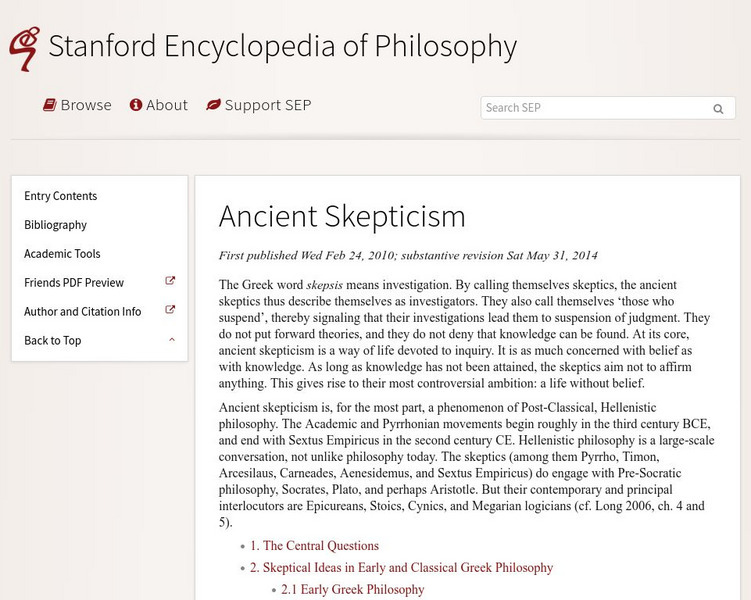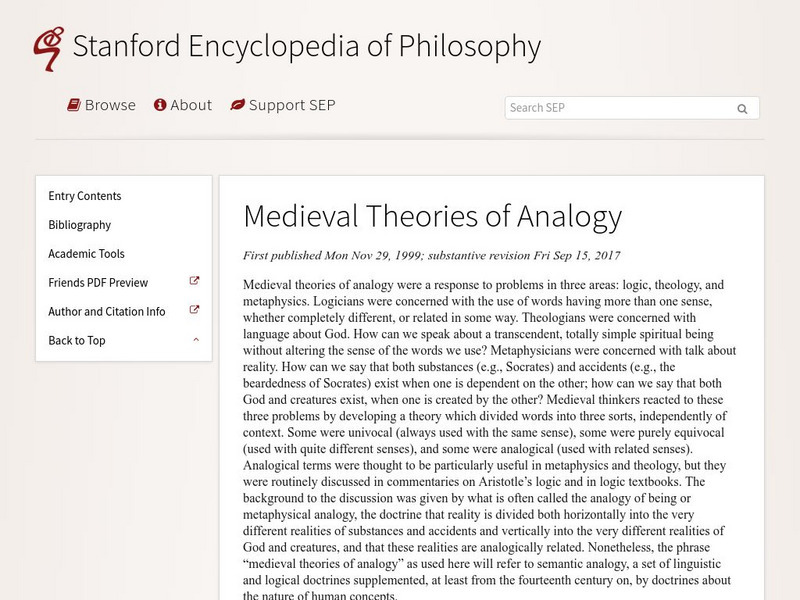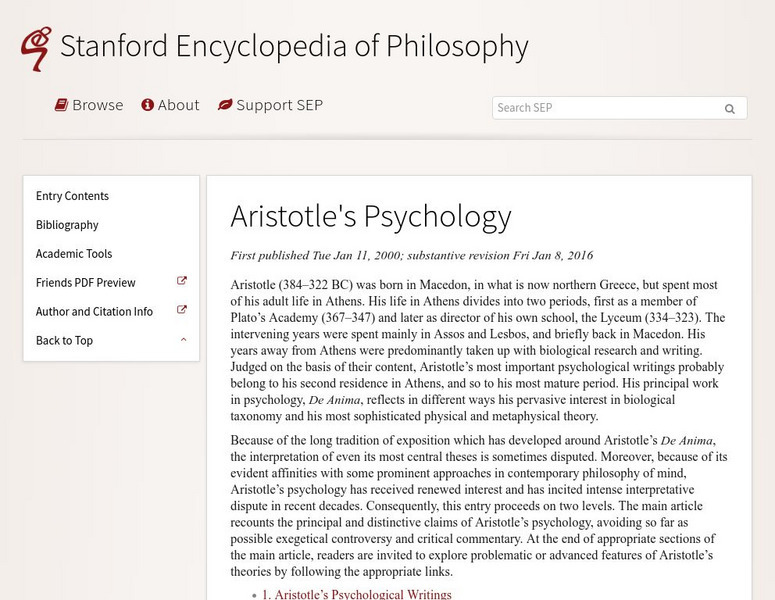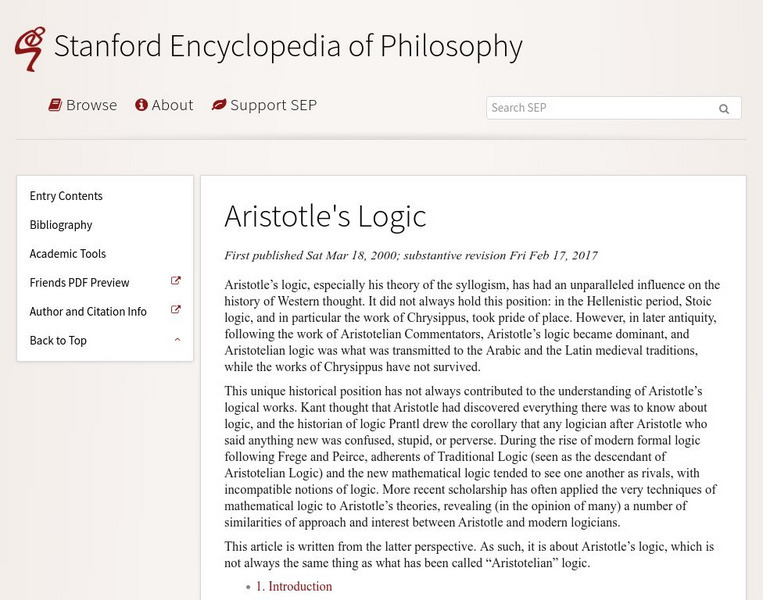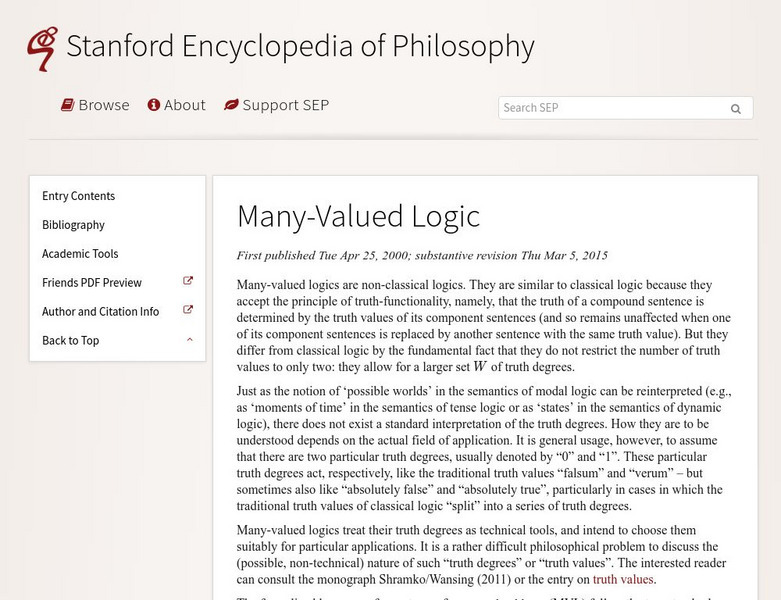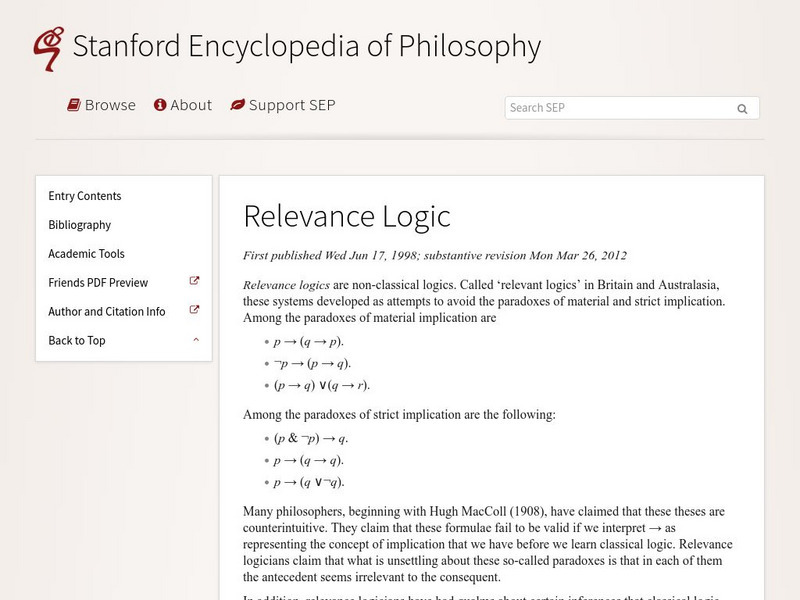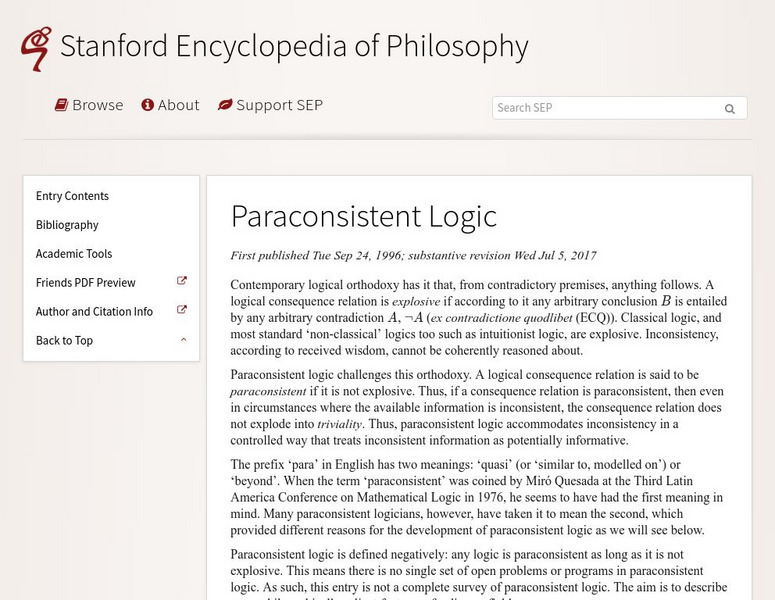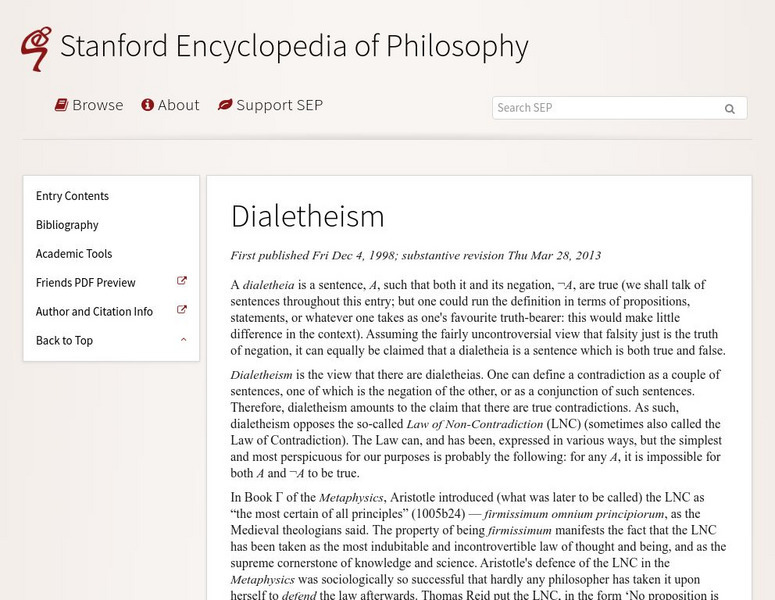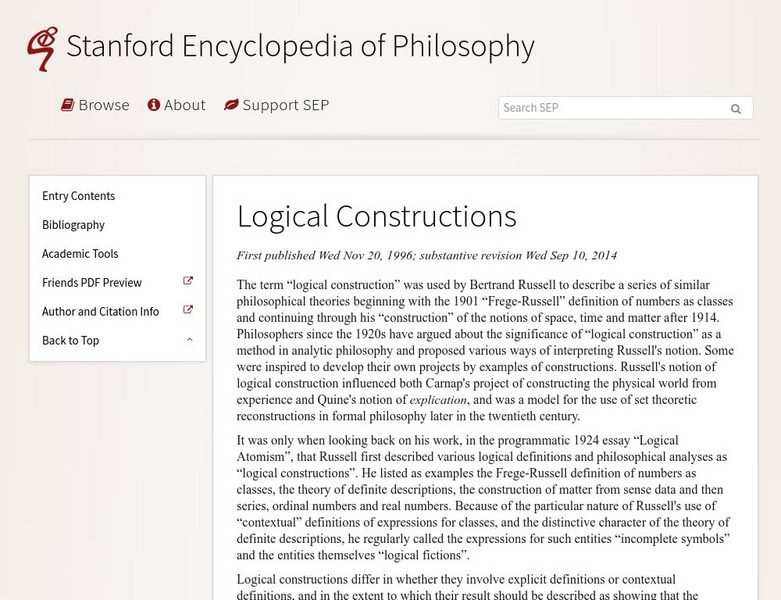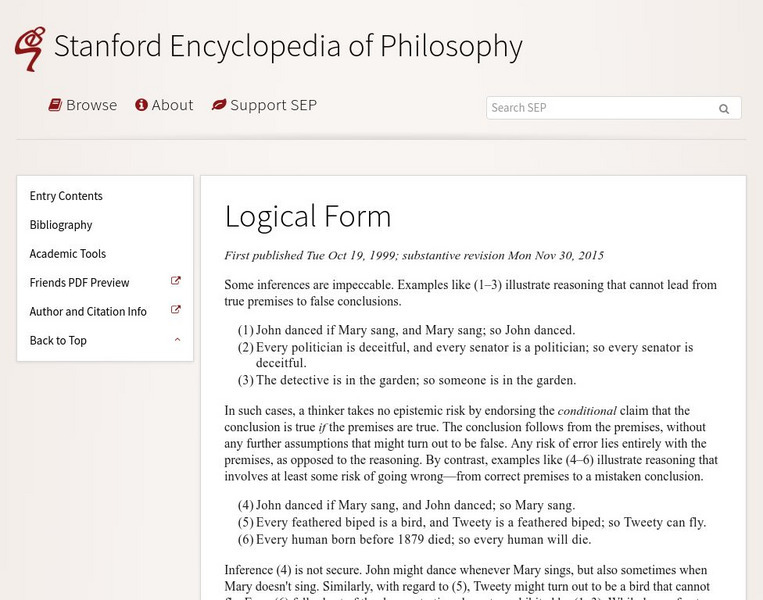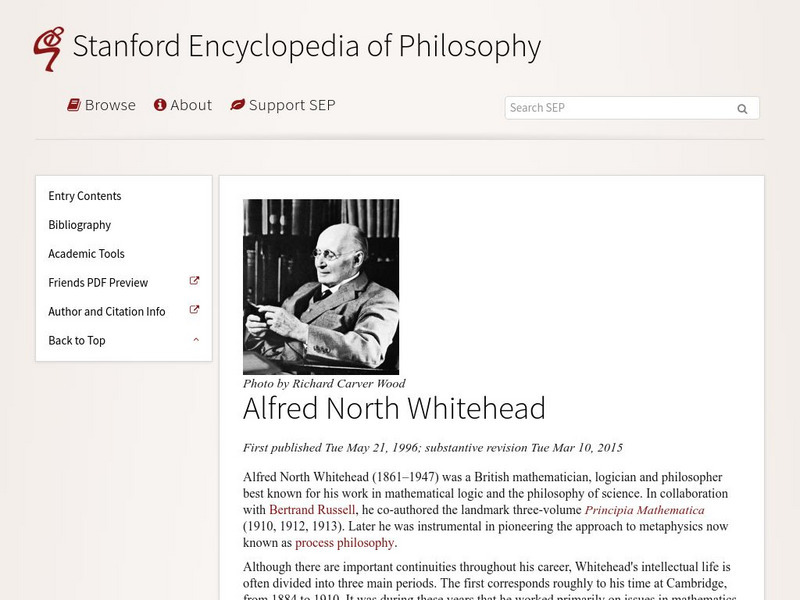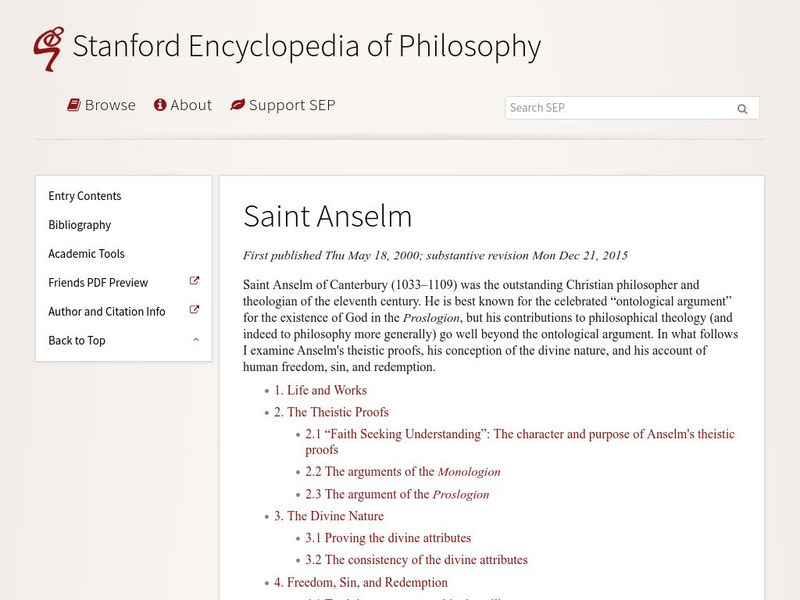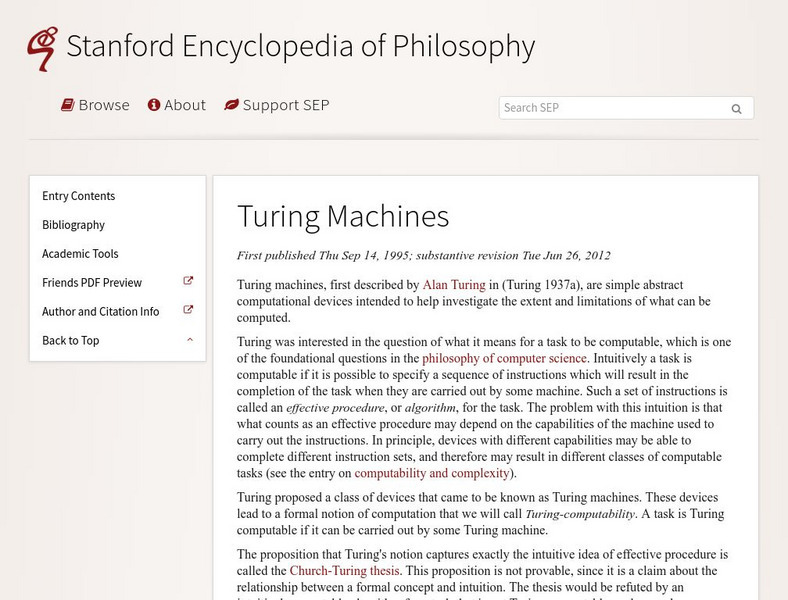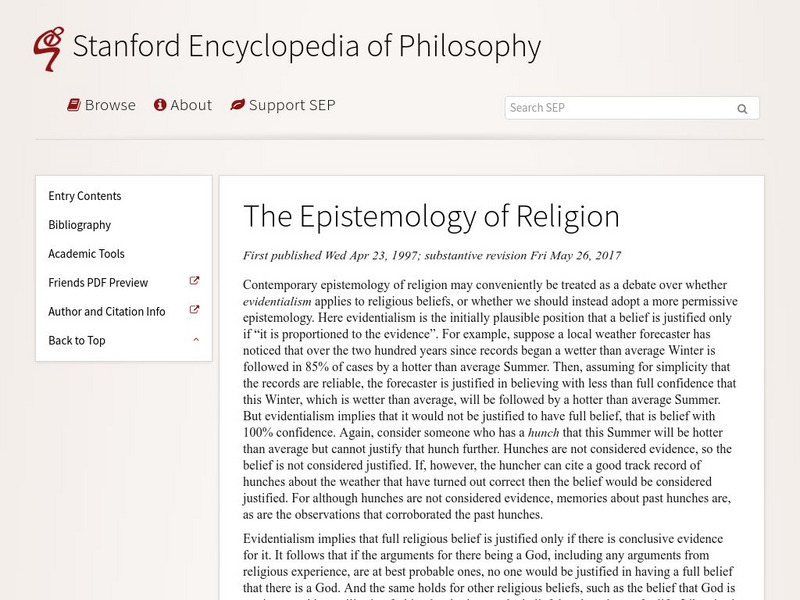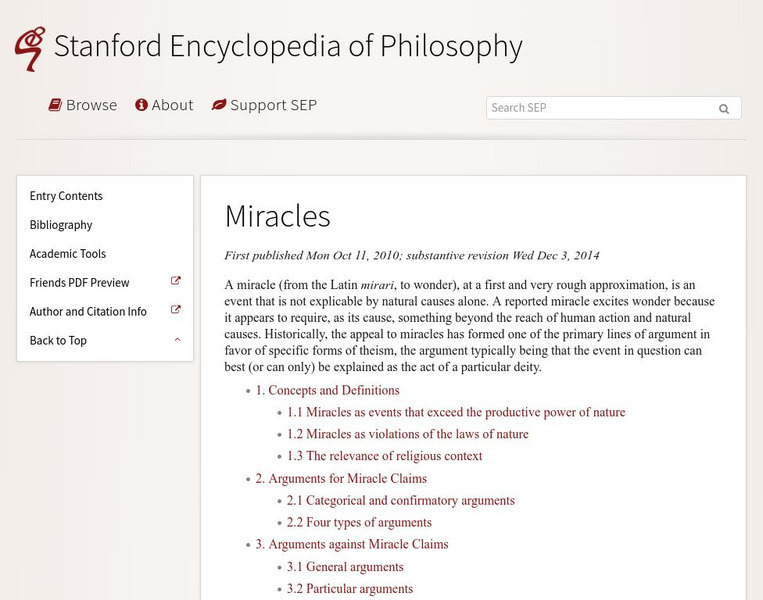Stanford University
Stanford Encyclopedia of Philosophy: Anicius Manlius Severinus Boethius
An in-depth study of the Christian philosopher from the 6th century C.E. There is a comprehensive biographical sketch plus nice analysis of his major works and ideas.
Stanford University
Stanford Encyclopedia of Philosophy: Pseudo Dionysius the Areopagite
A highly detailed look at the works and ideas of the Christian "Neoplationist who lived sometime during the early period of Christianity (5th-6th century C.E. His actual identity is still not known.
Stanford University
Stanford University: Voluntary Euthanasia
A well-reasoned and thoughtful discussion regarding the issues surrounding a person who wants to die. The author examines the conditions needed to make a case for assisted suicide and objections to allowing voluntary euthanasia.
Stanford University
Ancient Skepticism/stanford Encyclopedia of Philosophy
An excellent, detailed, and lengthy overview of the ancient Skeptic tradition. Divides into Pyrrhonic and Academic Skepticism. Includes many quotes and a full bibliography as well. A superb treatment of the subject.
Stanford University
Medieval Theories of Analogy
Read about the history of the use of analogies, beginning in the Middle Ages. Discusses analogies in terms of logic, theology, and metaphysics. Very informative.
Stanford University
Stanford Encyl. Of Philosophy: Aristotle's Psychology
Detailed, sophisticated analysis from the Stanford Encyclopedia of Philosophy of Aristotelian psychology. Discusses primarily his theories of "hylomorphism", mind, and perception. Also explains Aristotle's famous "four causes."
Stanford University
Stanford Encyclopedia of Philosophy: Aristotle's Logic
Thorough explanation of Aristotle's several original contributions to logic from the Stanford Encyclopedia of Philosophy. Includes a substantial bibliography as well as sections on syllogism, assertion, demonstration, the "Organon,"...
Stanford University
Stanford Encyclopedia of Philosophy: Category Theory
Explains major concepts in "category theory," a common alternative to traditional set theory. Some familiarity with the logical notation is assumed. Article does include sections on the history and general philosophical significance of...
Stanford University
Many Valued Logic/stanford Encyclopedia of Philosophy
Explains the logical theory of "many-valued logic," a modern alternative to classic logic. Sections address its history, notation and proofs, and applications to linguistics, mathematics, philosophy, and artificial intelligence. For the...
Stanford University
Relevance Logic/stanford Encyclopedia of Philosophy
Discusses the topic of relevance (or relevant) logics. Presents the theory and applications of relevance logic, which attempts to resolve "fallacies of relevance."
Stanford University
Stanford Ency. Of Philosophy: Paraconsistent Logic
This site from the Stanford Encyclopedia of Philosophy discusses the logical theory of true contradictions, known as paraconsistent logic. Article addresses the history of the theory's development and a technical presentation of its...
Stanford University
Stanford Encyclopedia of Philosophy: Dialetheism
Describes the notion of "dialetheism," the logical theory of true contradictions. Explains its history of development, its philosophical consequences, and its significance for rationality. Excellent bibliography.
Stanford University
Stanford Ency. Of Philosophy: Logical Construction
This site from the Stanford Encyclopedia of Philosophy discusses Bertrand Russell's notion of "logical construction" and its influence in the development of logical positivism. Mostly historical in orientation and is accessible to those...
Stanford University
Stanford Encyclopedia of Philosophy: Logical Form
A terrific introduction from the Stanford Encyclopedia of Philosophy to the conventions of notation and form in logic, and indeed to logical philosophy in general. Discusses the logical semantics of propositions, description, analysis,...
Stanford University
Stanford Encyclopedia of Philosophy: Singular Propositions
Helpful introduction to the mechanics of using "propositions" technically in logic. Article defines several important terms and uses good examples to contrast different types of propositions.
Stanford University
Stanford Encyclopedia of Philosophy: Russell's Paradox
Explains briefly the history and significance of Russell's famous logical paradox. Includes links to other Russell-related websites. Uses a minimum of technical notation.
Stanford University
Stanford Encyclopedia of Phil.: Principia Mathematica
This site from the Stanford Encyclopedia of Philosophy briefly explains the history and significance of the famous logical treatise by Whitehead and Russell. Lists the table of contents from each of its three volumes.
Stanford University
Stanford Encycl. Of Philosophy: Alfred North Whitehead
A biography of Alfred North Whitehead. It lists major events of his life in a chronology, summarizes his philosophical influence, and provides a bibliography both of his own writings and of secondary sources about him.
Stanford University
Saint Anselm: The Theistic Proofs
Explains Anselm's famous method of "faith seeking understanding" in the context of his ontological proof of the existence of God. Anselm's arguments are carefully enumerated in both the "Monologion" and "Proslogion", and then are...
Stanford University
Stanford Encyclopedia of Philosophy: Turing Machine
Explains what a Turing machine is and how one works.
Stanford University
Stanford Encycl. Of Philosophy: Epistemology of Religion
Excellent article examining several contemporary epistemological proposals for understanding "faith" philosophically. First discusses "evidentialism", then subjects it to critiques from several differing perpectives. Clearly written but...
Stanford University
Stanford Encyclopedia of Philosophy: Miracles
Excellent essay from the Stanford Encyclopedia of Philosophy on the philosophical response to "miraculous" events. Discusses the issues at stake in theories of causation, as well as Hume's famous refutation of miracles. Includes lengthy...
Stanford University
Stanford Ency. Phiosophy: Deflationary Theory of Truth
Sophisticated presentation from the Stanford Encyclopedia of Philosophy of a variety of deflationary theories of truth. Begins with a simple explanation and examples, but soon enlists somewhat technical language to explain subtler...
Stanford University
Stanford Encycl. Of Philosophy: Identity Theory of Truth
This site from the Stanford Encyclopedia of Philosophy explains the identity theory of truth as a variant of correspondence theories of truth. Presents the most important sources of the theory, arguments for and against it, and a...
Other popular searches
- Aristotle Socrates Plato
- Socrates, Plato, Aristotle
- Platonic Solids
- Aristotle Plato
- Plato Temperance
- Platoon
- Plato Republic
- Apology Plato
- Greek Philosophy Plato
- Plato Greek Philosopher
- Plato Lesson Plans
- Platoon Film



